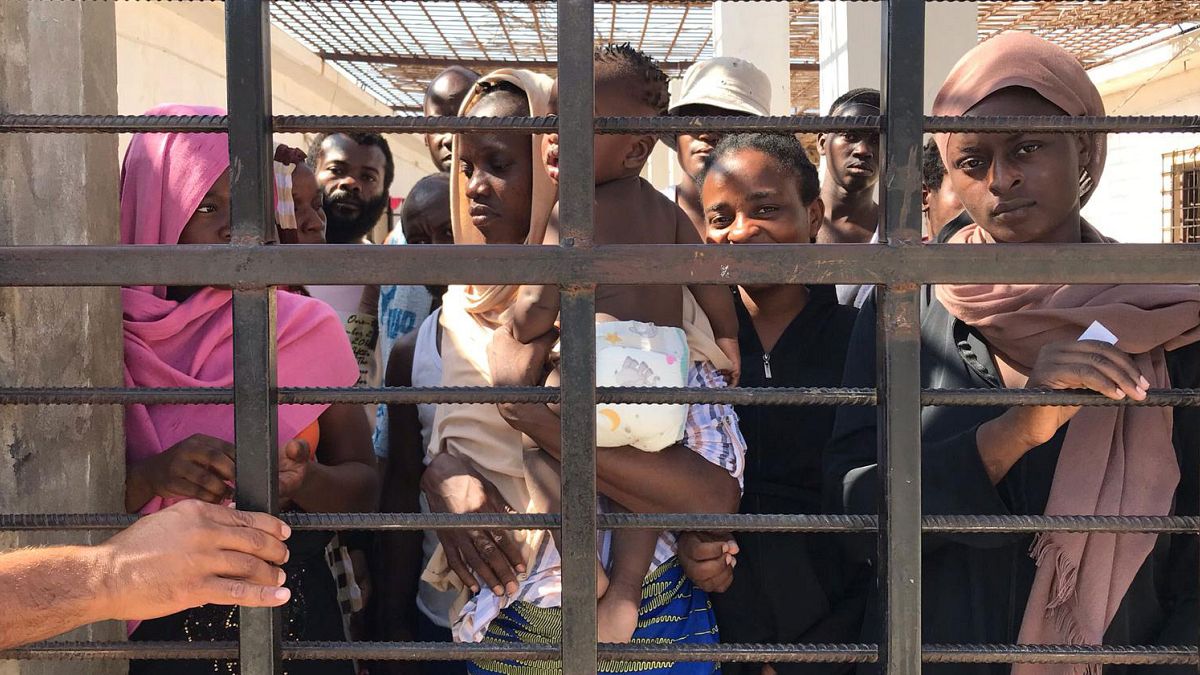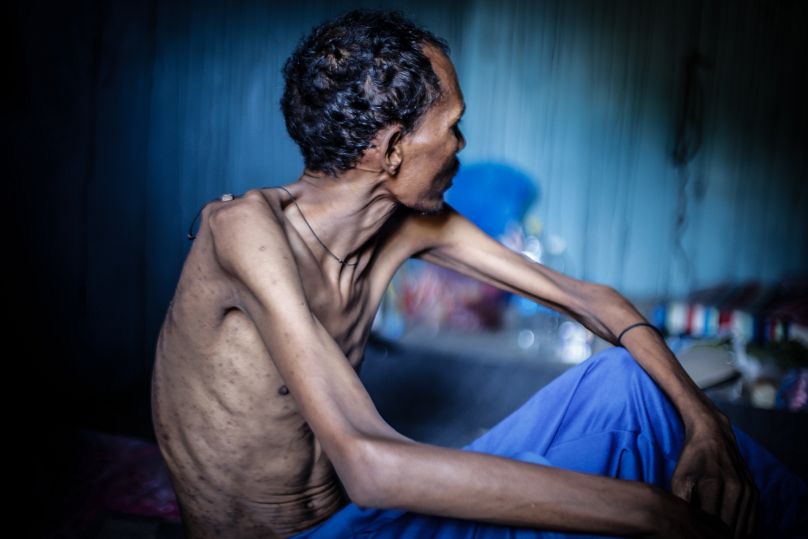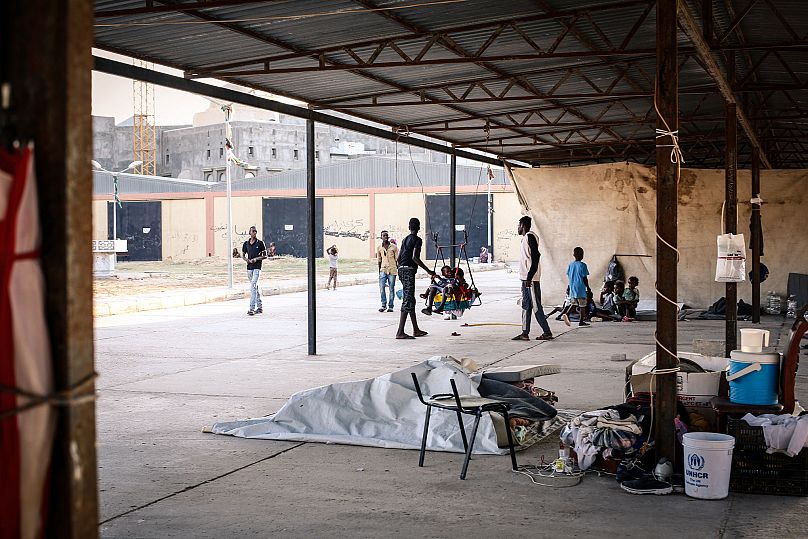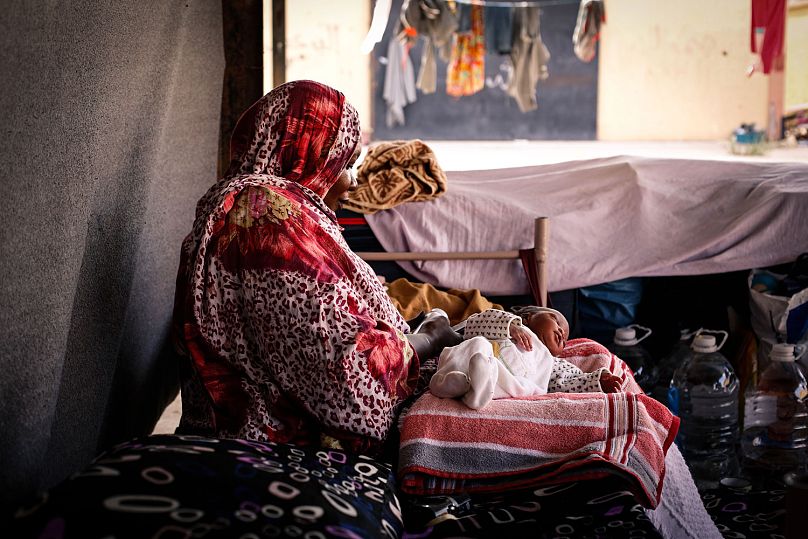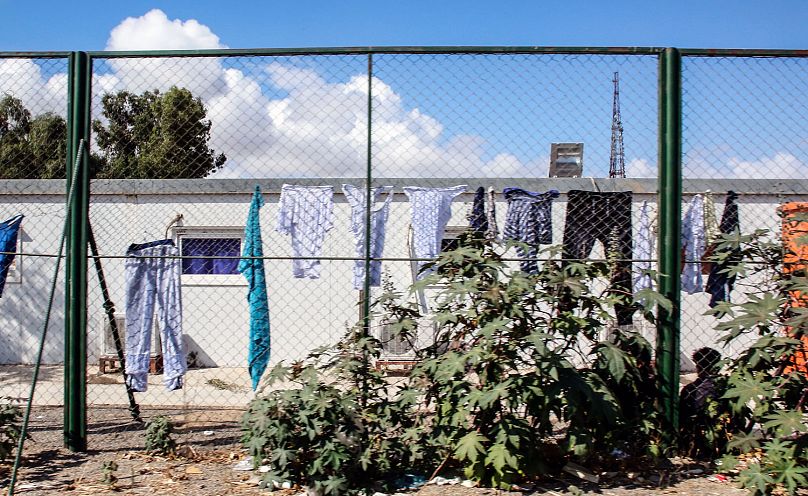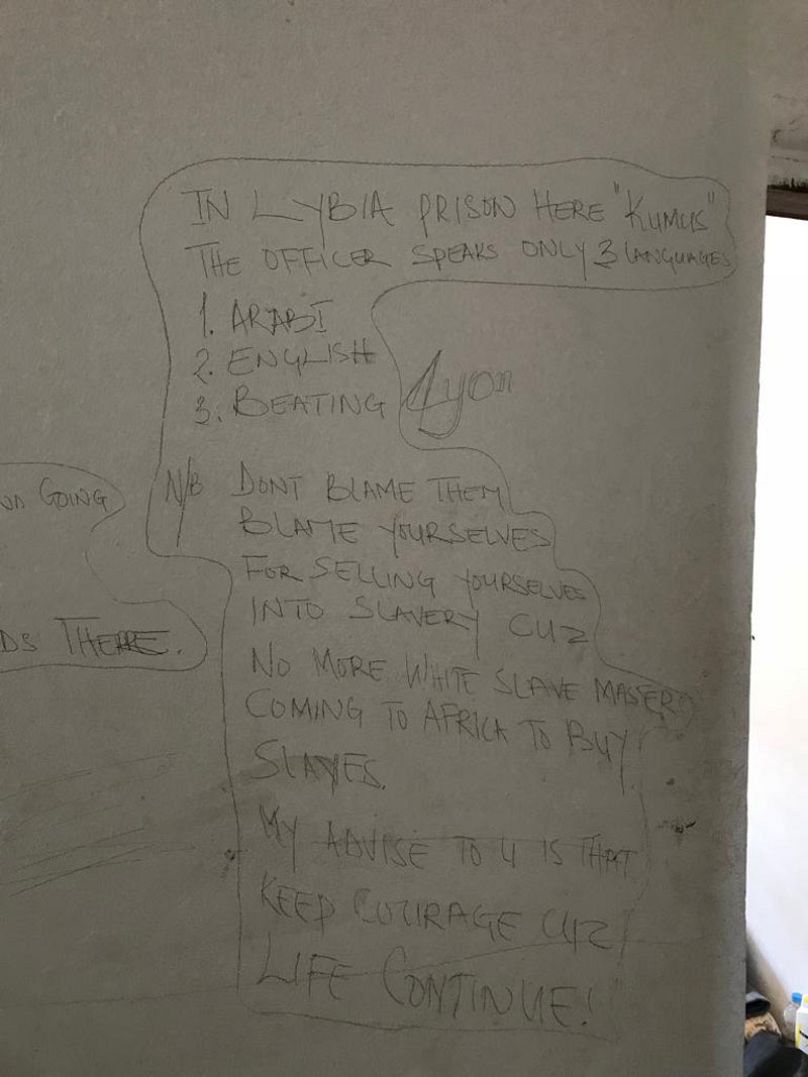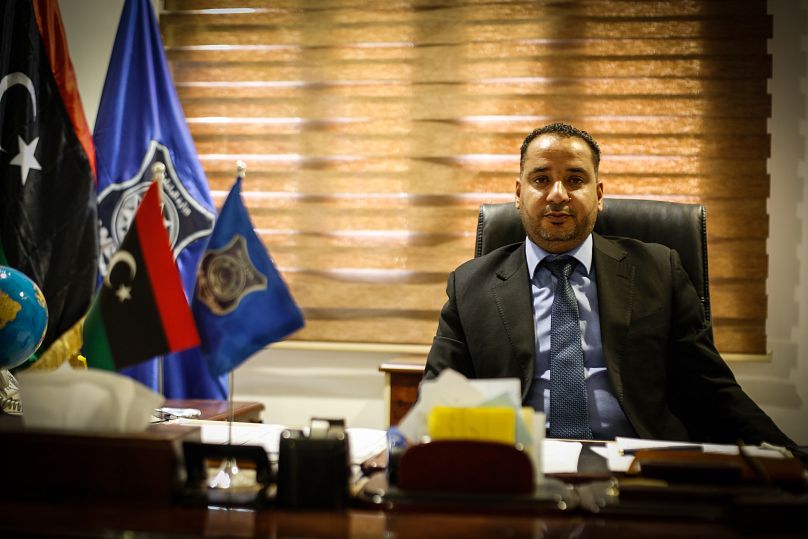Euronews has been able to speak under the condition of anonymity with a former Libyan UNHCR staffer who has been working in Tripoli.
Libya’s United Nations Refugee Agency has been branded “the worst in the region” by a former staff member who has alleged corruption, mismanagement and incompetence in its dealings with tens of thousands of vulnerable refugees and asylum seekers.
The former staff member, who spoke to Euronews on condition of anonymity, painted an image of an agency overstretched and out of its depth, with asylum seekers left homeless, deprived of medical care and in legal limbo in an increasingly violent and unstable Libya.
Migrants and refugees on the ground told Euronews that they had even bribed their way into Libya’s notorious detention centres in an effort to speed up their asylum claims. There they face exploitation at the hands of militia groups, which run the centres in all but name.
The former staff member described a chaotic infrastructure at UNHCR, where he worked for several years, with asylum seekers registered under incorrect nationalities and others forced to wait for months to hear the status of their applications.
Meanwhile, questions about UNHCR in Libya have stretched to procurement. An internal audit found that the agency had purchased laptop computers at inflated prices (eight laptops for just under $50,000) and used two travel agents to purchase almost $200,000 worth of flight tickets. The audit also notes that “no competitive bidding was conducted for the travel services” (sect. D of OIOS report 2019/007).
Medical care
Euronews has spoken to dozens of asylum seekers on the ground in Libya, including a man suffering from pulmonary tuberculosis. Asyas, 30, was discharged from the hospital by a UN medical partner, the International Medical Corps (IMC), and was now living in a private home in Tripoli.
“I’m just waiting to die,” he told us.
A medical source in Tripoli said that the hospitalisation of migrants and refugees - especially those cases with tuberculosis - is expensive, and some public hospitals lack the equipment to correctly diagnose the cases.
As a result, NGOs have to find a balance between paying very high bills to private hospitals or discharging patients too early, the source concludes.
The IMC told Euronews it cannot comment on the case.
The feeling on the streets is one of abandonment by international institutions. Asylum seekers in urban areas believe that the UN agency will be there to help them find accommodation for example but the UNHCR are not obligated to do so.
In one case, a group of Sudanese refugees – including expectant mothers and newborn babies - have been living for several months in an abandoned warehouse in an area of Tripoli known as al-Riyadiya.
The group were since evicted from the warehouse and are now sleeping in front the UNHCR community day centre, waiting to be moved to safer housing.
Commenting on the experiences Euronews uncovered, a spokesperson for the UNHCR, Charlie Yaxley, said: “Life for many refugees is extremely difficult and what we can do is at times very limited.”
Libya in the eye of the storm
Libya has been at the forefront of the migrant crisis and is the embarkation point for many boats that attempt to cross the Mediterranean to Italy.
Libya’s lawlessness since the 2011 war that followed the overthrow of Colonel Gaddafi has seen the rise of numerous militia groups, all competing for a piece of the lucrative migrant trade.
A large part of that trade is the operation of detention centres, officially run by the government but effectively controlled by militia groups. Asylum seekers detained in Libya are held at the centres, where they are often subject to abuse and violence.
The conditions at detention centres has got so bad that the UNHCR prioritise the processing of refugees and migrants that are held in them - as they are considered among the most vulnerable. This has led to asylum seekers actually bribing their way into centres, sources say.
In December, migrants and refugees detained in Khoms Suq al-Khamis started a hunger strike to persuade UNHCR to visit the centre and register them in the hope that this might stop them from being sold and disappeared.
Amina, a Somali refugee now in Triq al-Sikka facility in Tripoli confirmed to Euronews that she paid money to be “accepted into detention and have a better chance to be registered and evacuated".
The former UN staff member detailed one case where he claims a pregnant rape victim had opted to return to a detention centre in order to be considered for evacuation.
At the Abu Salim detention centre, Eritrean refugees have been begging the detention centre manager to admit them, with the sole hope of being evacuated.
Others are paying to get themselves in to the UNHCR's Gathering and Departure Facility (GDF) - managed by the Libyan Ministry of Interior, UNHCR and UNHCR’s partner LibAid - in Tripoli, where refugees are normally hosted until their transfer to another state is confirmed.
There, one refugee awaiting evacuation told Euronews: “The guards who are working at the gate, brought inside Somalian and Eritrean women; they paid 2000 dinars (around 430€) each. We told this to UNHCR, and they asked us not to tell anyone”.
Commenting on the allegations, Yaxley said: “UNHCR takes any claims of misconduct very seriously. Any claim that is found to be valid following an investigation is followed by a zero tolerance approach. We strongly encourage any victims to directly contact our Inspector General’s Office.”.
Lack of information
Aside from bribery, the former employee said that the fate of individual asylum seekers and their families in Libya largely relies on luck.
“It’s up to the office,” the source said.
“At the beginning of 2019, the UNHCR registered a woman from Ivory Coast (which is not among the 9 nationalities that are prioritised according to Cochetel), only because there was a recommendation letter from a higher rank.
“Sometimes you may wait months to register a case because no one will give you approval; there are cases of favouritism and a lazy attitude. All registration processes are unclear.”
Many refugees and asylum seekers in Tripoli complained to Euronews about the lack of information available to them about their personal case. The former employee said that this is part of a strategy at the agency in order to avoid having to deal with the huge amount of admin involved.
“It’s a general attitude not to answer refugees and keep them blind to avoid more requests. In Tripoli, refugees or asylum seekers are left without a clue. They don’t know if they are accepted or rejected.
“They receive very little information about their file and most of the time, no proper update about the process, or in case they have to appeal if their request has been rejected.”
The source said that since September 2017 there is no system in place to appeal against rejection on their refugee status, and asylum seekers don’t know they have the right to appeal the decision within 30 days.
One family from Nigeria, now detained in Az-Zāwiyah detention centre, described their experience.
“The first time we managed to meet UNHCR was secretly in Tarik Al Matar centre in July 2018. Since that time UNHCR is refusing to register us. When we try to ask about our cases they kept telling us later, next time, next time,” the father said.
“Sometimes they avoid us totally. Once, UNHCR has even advised us to return home. My youngest girl has been born in detention and the eldest have some traumatic effects due to a whole lot of horrible stuff they've experienced.”
Meanwhile the situation in Libya is only likely to get worse, with a bottleneck in some states like Niger slowing down the evacuation plan from Libya.
There are currently 1,174 evacuees from Libya staying in Niger, including 192 evacuated unaccompanied children, according to UNHCR. With the Emergency Transit Mechanism (ETM) at full capacity, many cases are still pending a decision.
"The Government of Niger has generously offered additional space for up to 1,500 refugees in the Emergency Transit Mechanism run by UNHCR in Niamey with financial support from the European Union," writes Cochetel in May 2018.
Mistakes
To make the situation worse, according to the former employee, many mistakes have been made including nationalities wrongly assigned to individuals.
“UNHCR was registering Chadians as Sudanese, or Ethiopians as Eritreans. The UNHCR staff in Libya was not qualified to properly understand the situation,” the source said.
Commenting on that claim, Yaxley said: “UNHCR staff are selected through the same processes as in all other operations worldwide, following human resources rules. There are over 100 national staff working in Libya. UNHCR does not work with external contractors.”
The aforementioned concentration on nine specified nationalities was put in place in order to keep numbers down, the former staff member said.
Libya’s Undersecretary of the Ministry of Interior for Migration, Mohammed Al-Shibani, said that on the contrary the Libyan government is not refusing to register other nationalities. “The nationalities are determined by the UN not by us,” he said.
Procurement
On issues with procurement, the former staff member points Euronews at the internal UN audit of the operations in Libya, which found that UNHCR designated procurements to 12 partners worth $4.7 million and $4.0 million in 2017 and 2018 respectively.
But the mission “did not conduct any cost-benefit analysis”, opting instead for direct procurement “despite the significant differences between official and market exchange rates.
In 2017 and 2018, “the mission designated procurement exceeding $100,000 to three partners without them being pre-qualified by the Procurement Service at headquarters”. A lack of procurement plans resulted in ''unnecessary and higher” costs.
For example, the audit found a transaction for eight laptops with total expenditure of $47,067 (equivalent to a unit cost per laptop of $5,883). Moreover, flight tickets amounting to $128,000 and $66,000 during 2017 and 2018 were bought from two different travel agencies without any clear process for selection, as mentioned in the audit and confirmed by a former UN source.
"The mission was unable to demonstrate it used its resources effectively and efficiently in providing for the essential needs of persons of concern. The lack of reporting also increased UNHCR's reputational risk", reads the audit.


